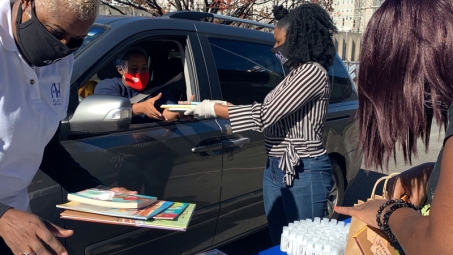
Overview
Book Rich Environments is a collaboration between nonprofit organizations, national government agencies and corporate publishers that aims to infuse public housing communities across the U.S. with a vibrant and accessible culture of books and to improve opportunities and outcomes for children living in public housing.
The National Book Foundation serves as the project lead, with the Urban Libraries Council, U.S. Department of Housing and Urban Development, U.S. Department of Education and National Center for Families Learning serving as key national partners. Public housing authorities serve as local partners, implementing the initiative within their community with support from the local public library and other literacy partners.
Learn more about BRE on the National Book Foundation's webpage.How It Works
- Book Distribution – Public libraries participating in BRE partner with local housing authorities in their community. The library receives a set of high quality and diverse books, secured by the National Book Foundation and donated by national book publishers.
- Partnership Building – In participating communities, libraries establish and maintain partnerships with the local public housing authority and local and national organizations dedicated to advancing literacy.
- Library Engagement – Through BRE, local libraries engage children and families in ongoing visits and literacy activities. The local library and public housing authority partner to register families for library cards and promote outreach strategies such as pop-up libraries in public housing buildings.
“Youth in some of our most underrepresented areas are able to enjoy brand new hardback books with illustrations and stories that mirror their images and their lives while becoming connected with local literacy and library resources available in their community.”
— Gwendolyn Weddington (Atlanta, GA)
2024 BRE Communities
Akron, OH | Louisville, KY |
Helpful Resources for Fostering Book Rich Environments
Cultivating Readers Magazine
Learn MoreThis parent-friendly magazine from the National Center for Families Learning provides effective and easy strategies to promote reading throughout a child's early years.
Libraries for a 21st Century: It’s A Family Thing
Learn MoreThis set of resources from the Global Family Research Project can help promote the library as a space to create new knowledge, connect with community resources and enrich school learning.
Parent Guide for Reading & Standards
Learn MoreThis guide from the National Center for Families Learning helps parents better understand standards and ways they can connect with teachers to help their child meet the standards at home.
Promoting Attendance Awareness
Learn MoreThis toolkit (including webinars and resources) from the 2021 Attendance Awareness Campaign provides targeted guidance and strategies to help all local education leaders strengthen their role in ensuring children regularly attend school.
